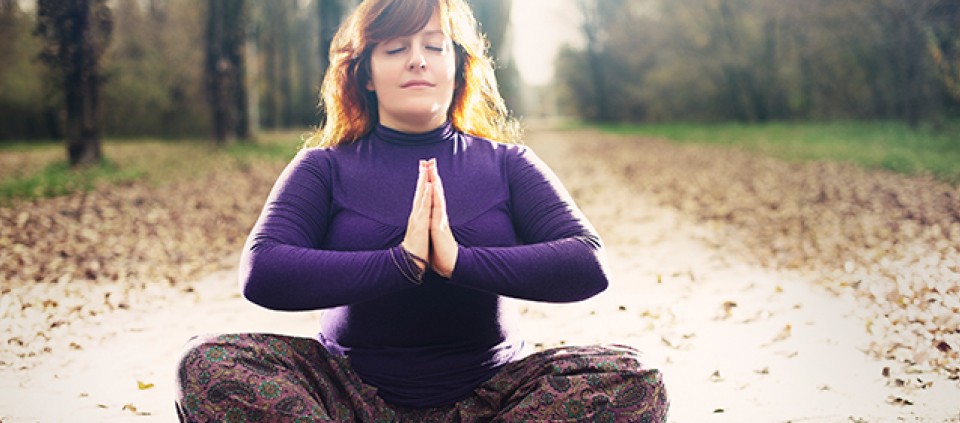Do You Adore Your Body? Maybe It's About Time You Started

When I was 12 years old, I would pour through the high-fashion pages of Vogue magazine. I honestly wish I hadn’t been allowed to. I’d developed early. By 12 years old, I could already fit into women’s clothing. With just a bit of makeup, I could easily pass for a 20-year-old. Staring at those provocative images of beautiful women (and beautiful teenagers, I'm sure) whose hips were narrower than mine, whose thighs were leaner, whose stomachs were flatter, and whose breasts were perkier, all I could feel was inadequate.
That was the beginning. For more than 30 years, I struggled with yo-yo dieting and frequent bouts of clothing hysteria, whereby I’d put on one item of clothing in my closet after another, only to rip each one off in a fit of disgust and despair, often in tears. My hips were too wide. My thighs were too thick. My breasts were too large. I didn’t adore my body; I hated it.
It’s a story Erica Mather, yoga instructor, creator of the Adore Your Body System, and my latest Kripalu Perspectives guest, knows well. “Body image begins to develop at a young age and is affected by many influences including media, parents, and peers,” she says, adding that women tend to suffer from poor body image more than men because “for centuries, a woman’s value was defined through her body—her ability to bear children, her attractive face.” She says that in recent history, “a woman’s value has been reduced to one thing: her ability to be thin and stay in shape. Teaching women that they are nothing more than a body and a face is a great way to keep them cowed.”
Given that images of physical perfection are ubiquitous, it’s easy to get caught up in thinking that if only our bodies were thinner or more toned, we’d be happier. But Erica says that belief is a fallacy. “The way you think about your body is the problem,” she says. “When you change your mind about yourself, you’ll come to see your body wasn’t the problem in the first place.”
One of the steps in Erica’s Adore Your Body System, which aims to help people understand the underlying mind-sets that compel them to think harmful thoughts about themselves so they can develop a healthier body image, is to “live happily.”
To get a taste of this step, Erica had me answer a series of written questions. I had to write about what happiness means to me, how it relates to my body, what I’m seeking in order to attain greater happiness, whether I’m certain what I want will make me happy, and if I believe it’ll make me happy indefinitely.
What became clear while doing the exercise is that I often equate happiness with external forces, like my work, income, relationships, and appearance. While I know happiness is an inside job, I don’t often treat it as such. The 12-year-old in me can still allow the number on the scale to affect my mood. Along these lines, another question Erica posed was, “What’s one thing you can do to feel happy today?” I wrote that I could soak in a warm bath with candles and incense and soft music, something I rarely do. But how might something as simple as taking a bath help me feel better about my body?
“When you take care of yourself—whether on a physical level or a emotional/spiritual one—the body responds,” Erica explains. “When the body feels better, it supports a better mood. When your mood lifts, thanks to taking care of your body, it creates an upward spiral. Your body feels good; you feel good.”
Beyond changing damaging mind-sets and engaging in happiness-promoting activities and behaviors, Erica says another way to develop body confidence is to build a closer relationship with your body. “I find yoga to be a great method to get to know your body,” she notes. Others may prefer dance or martial arts or sports, but engaging in practices that help you appreciate your body’s strengths and abilities can enhance the way you feel about it.
Over time, by making incremental changes like these, body confidence grows, Erica says. She adds that when it does, “You feel free to pursue life based on your value as a human, not based on your external appearance. You understand that your appearance may affect your experience—how others react to you, opportunities granted or withheld—because society will insist on judging your worth based in part on how you look. But you're wiser, stronger, and above all, you know your worth. You proceed forward unswayed by what others may think. You feel free.”
How I wish someone had instilled this wisdom in me when I was 12.
Portland Helmich is the creator, host, and producer of the Kripalu Perspectives podcast series. She has been investigating natural health and healing as a host, reporter, writer, and producer for more than 15 years.
© Kripalu Center for Yoga & Health. All rights reserved. To request permission to reprint, please e-mail editor@kripalu.org.
Portland Helmich has been investigating natural health and healing for more than 15 years, as a host, reporter, writer, and producer.
Full Bio and Programs